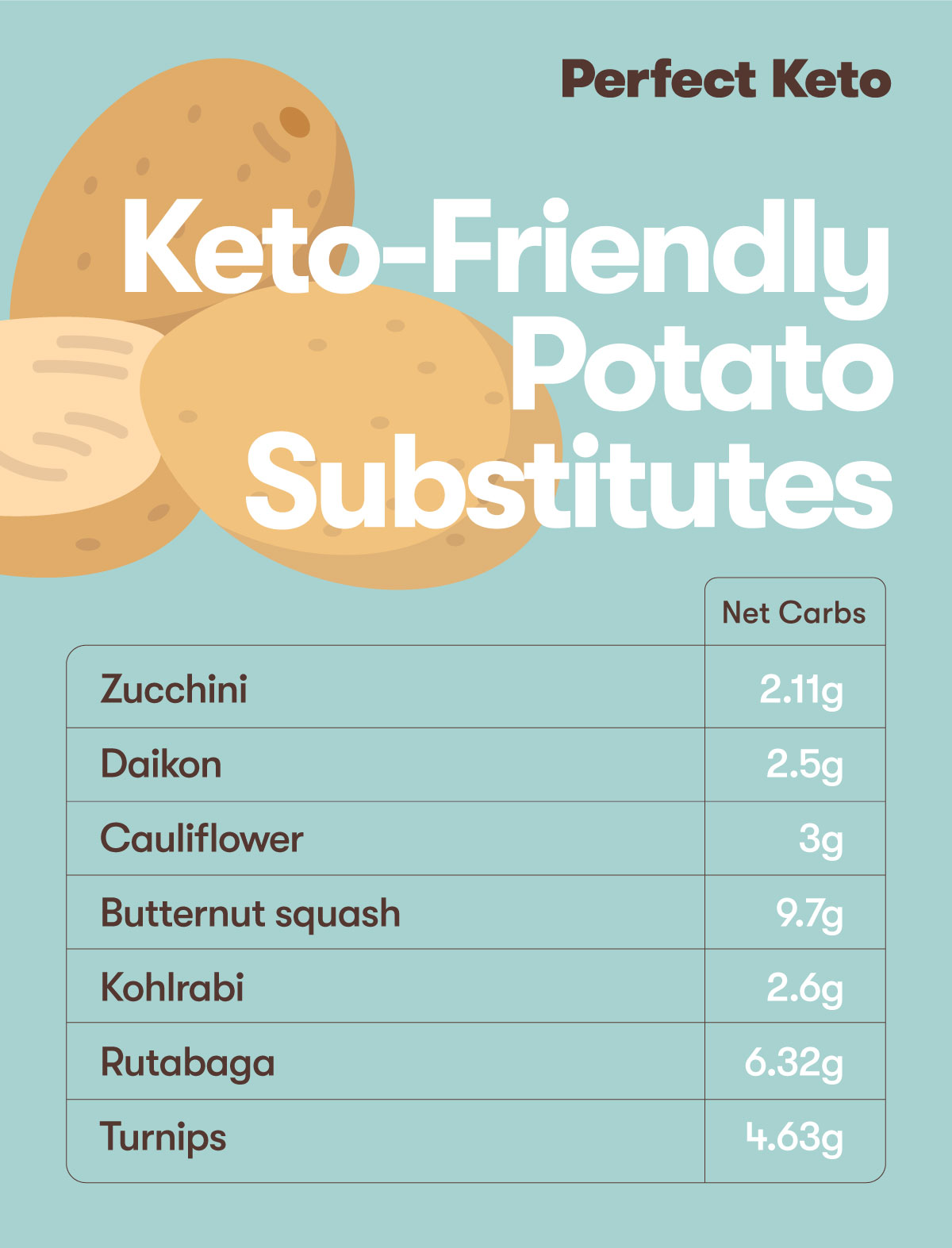Given that potatoes are such a versatile food, it’s no surprise that a lot of people love them. But are potatoes keto? This is an important question to ask when you’re on a very low-carb plan. Followers of the keto diet consume a variety of plant-based sources, but some options are going to be off-limits. Starchy veggies, for example.
Before going keto, here’s what you need to know about the net carbs in potatoes, whether and how you can eat them on keto, and substitutes to keep you in ketosis.
Are Potatoes Keto-Friendly?
Potatoes contain too many carbs per piece, which makes it difficult for you to maintain ketosis. So, the answer is no — potatoes are not keto. Although potatoes are gluten-free (which many keto-friendly foods are), unfortunately, they’re high on the glycemic index, meaning that they raise your blood sugar quickly (*).
Eating foods that do not raise blood sugar or only cause a slow rise (such as lettuce and cucumbers) is the best way to stick to keto and reap its health benefits.
How Many Carbs in Potatoes?
According to the USDA, a 100-gram serving of potato contains around 15.4 grams of net carbohydrates (*). However, since different potato varieties exist, you will notice a difference in their counts depending on the type. Have a look at the table below:
| Type of Potato | Weight | Total Carbs | Dietary Fiber | Net Carbs |
| White (*) | 100 grams | 21 grams | 2.2 grams | 18.8 grams |
| Russet (*) | 100 grams | 18 grams | 1.3 grams | 16.7 grams |
| Red (*) | 100 grams | 15.9 grams | 1.7 grams | 14.2 grams |
| Yellow (*) | 100 grams | 17.57 grams | 1.4 grams | 16.17 grams |
| Carisma (*) | 100 grams | 10.3 grams | 1.6 grams | 8.7 grams |
The last item on the table is the Carisma potato, which has been recently introduced on the market. In case you’re wondering why this potato has the fewest carbs per serving in comparison with the rest, it is produced by cross-breeding certain potato seeds, resulting in potatoes that do not spike blood sugar quickly. What’s interesting is that they’re not genetically modified.
So, although potatoes aren’t keto in general, Carisma potatoes can be an option for people who love potatoes but are trying to keep their blood sugar under control. The only caveat is that they can be quite expensive.
Can You Eat Potatoes on Keto?
Since potatoes are generally starchy and high in carbs, they are to be avoided on the keto diet. It’s easy to get knocked out of ketosis when you eat regular potatoes. The only exception is the Carisma potato, which has a GI score of 55 compared with a white potato with a GI score of 82.
However, if you decide to eat potatoes on keto, regardless of the potato variety — it is possible to do it during your higher carb days within a Cyclical Keto Diet (CKD). Alternatively, you may consume 200 grams of potatoes, which have fewer than 40 grams of net carbs, around your workouts as part of a Targeted Keto Diet (TKD).
Otherwise, adhere to foods recommended on a Standard Keto Diet, which most individuals follow for general weight loss and health. Also, if you’re doing keto to manage a medical condition as prescribed by your doctor, be sure to ask them about how to eat potatoes on keto — when it’s possible, the amount, and other rules you may need to follow.
Keto-Friendly Potato Substitutes
Instead of potatoes, choose these lower carbohydrate vegetables. You can use them in a number of recipes that call for potatoes, such as fries, casseroles, and salads. Below is our list of potato substitutes and their net carbs per serving:
- Zucchini: One of the best veggies to help lower your carb intake, zucchini is low in calories and provides vitamin A, vitamin C, B6, and antioxidants. There are 2.11 grams of net carbs in a 100-gram serving of zucchini (*).
- Daikon: Also called “winter radish,” “Japanese radish,” and “Chinese radish,” daikon is popular in Asian cuisines. It’s crispy and high in vitamin C.There are 2.5 grams of net carbs in a 100-gram serving of daikon (*).
- Cauliflower: This cruciferous vegetable is another replacement for potatoes — baked tots party appetizer, for example. There are 3 grams of net carbs in a 100-gram serving of cauliflower (*).
- Butternut squash: Butternut squash may have slightly more carbs than the rest of the options on this list, but it’s still better than potatoes. There are 9.7 grams of net carbs in a 100-gram serving of butternut squash (*).
- Kohlrabi: With a taste and texture that’s similar to broccoli, kohlrabi can be used for making soups and stews. There are 2.6 grams of net carbs in a 100-gram serving of kohlrabi (*).
- Rutabaga: This vegetable is sweeter than potatoes. Cook it by bringing it to a boil or roasting it. There are 6.32 grams of net carbs in a 100-gram serving of rutabaga (*).
- Turnips: Turnips are abundant in vitamin C and many natural antioxidants. There are 4.63 grams of net carbs in a 100-gram serving of turnips (*).

The Bottom Line
There may be lots of carbs in potatoes, which means they’re not great for someone on the keto diet, but fortunately, you can choose from healthier alternatives. What’s more, you can even use them in recipes involving potatoes. Try zucchini, daikon, cauliflower, butternut squash, kohlrabi, rutabaga, and turnips!
For those who want to know how to eat potatoes as part of a low-carb lifestyle, do it when you’re intentionally going out of ketosis — that is, on a cyclical keto diet — or around your workouts while on a targeted keto diet.
